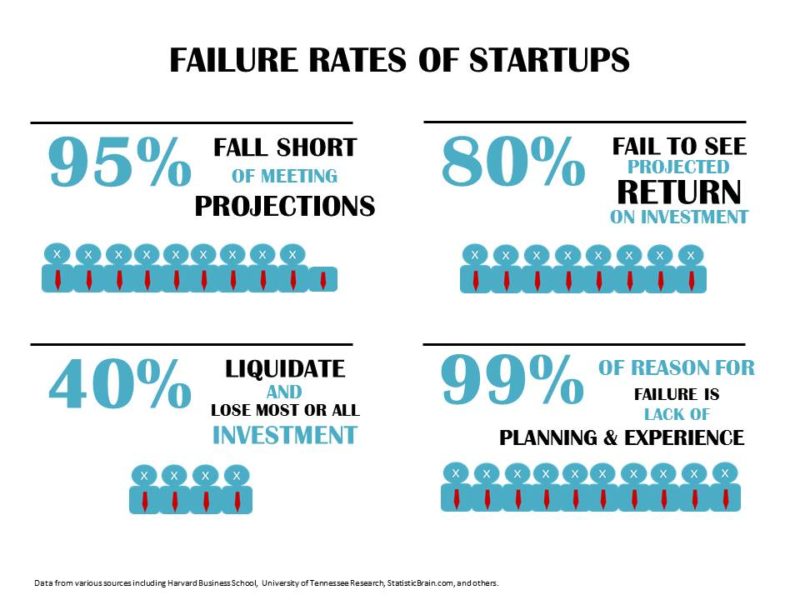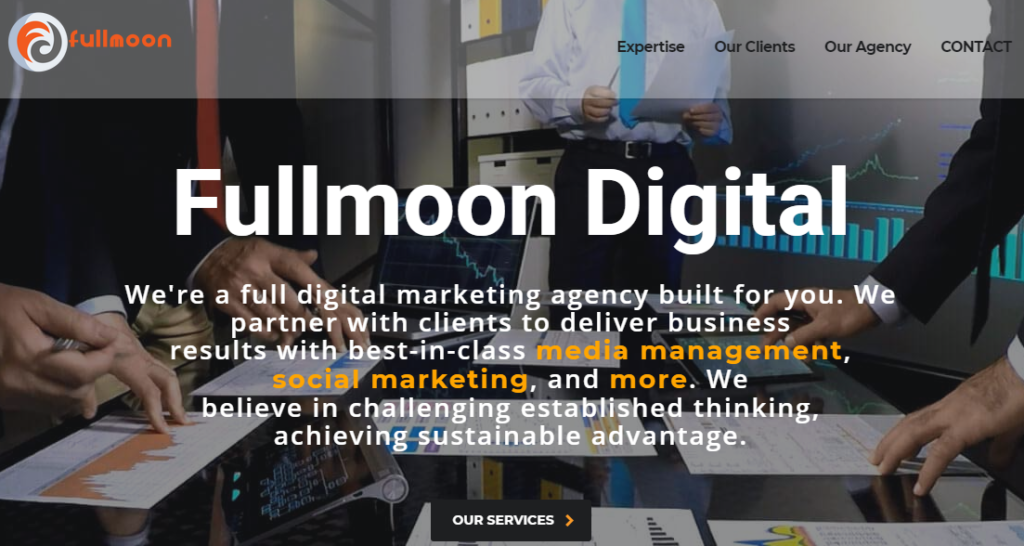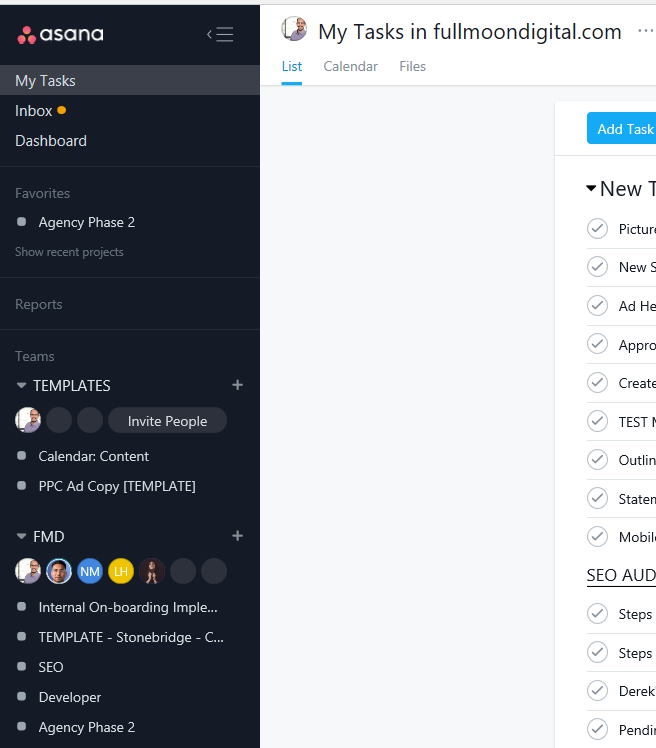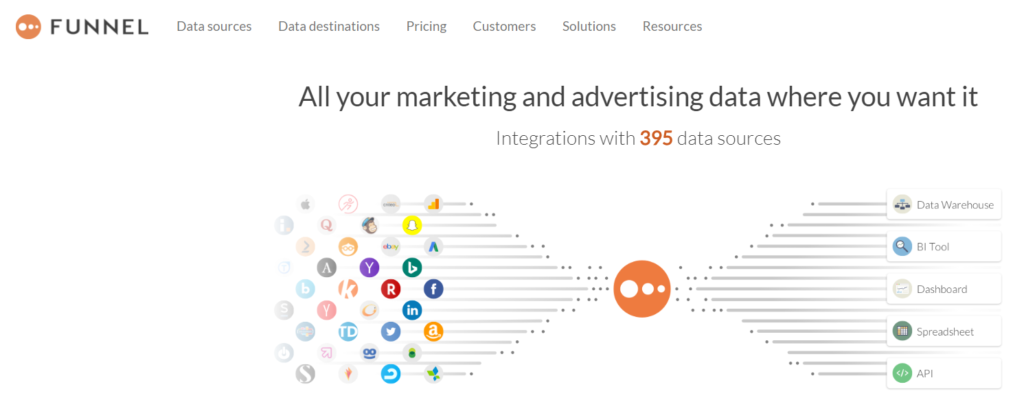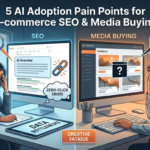The stark truth is that 99% of start ups fail, and a fraction of the remaining 1% might be profitable, and that’s being generous.
That’s 1 in every 100 startups!
Several launch and fail within the same year, while others die a slow death as they spend their newly found VC money on lavish office spaces, high-powered executives, amazing company perks, a huge sales team, sometimes due to financial infidelity, product fit, and a myriad of other reasons.
According to sources like HBS and SatisticBrain.com, a whopping 95% fail to meet projections and 99% fail because of lack of experience.
That sounds like a high percentage, but it’s not unrealistic.
While most of the failed startups that hit the press are well-funded, there’s even a larger group of smaller startups that don’t get to enjoy success of that no one hears about.
There’s a list of well-funded startups that fail every year.
CBInsights has a huge list of over 130+ startups that failed. There are a few names on this list that you might have even spent money on before.
You’ll notice that they are businesses that are well funded, so money was not the cause of their demise.
It’s funny when I talked to other entrepreneurs and solopreneurs, they are always trying to figure out how to get funded, as if that was their driving purpose in starting their business.
I hope you are not in that mindset.
Start up survival guide
I wrote this article to focus on something else. It has nothing to do about characteristics of how start ups fail or succeed.
If you are interested, Neil Patel has a nice piece on Forbes.com you can read here.
Rather, this article is about what I have learned through my journey and hopefully it will help someone out there.
I will talk about a few taboo issues; I was personally uncomfortable of at first. But I realized, there is no way on earth I’m the only one going through this!
The experience and lessons I learnt have become my business pillars as my team and I continue to grow our ad agency.
Let’s dive in.
It’s OK to pay yourself
I don’t know about other start up founders out there, but I have mortgage, car payments, and other bills to pay each month.
I DO know I have no inheritance, didn’t win the lottery, no angel investors, or have any venture capital funding. And that’s OK. That just mean I still have autonomy of the direction of our culture.
But I do have clients, which means the company is generating revenue.
So the first lesson.
I pay myself every month, as an employee of the company. The reason?
Financial obligations. I need to take care of the financial “distractions” so I can focus on the financial objectives of the company! It’s that simple.
By becoming a paid employee, I have one less thing to worry about.
My bills. I don’t have to spend hours writing or you wasting minutes reading my LinkedIn posts about my struggles of not taking a paycheck as a founder. I am no different than anyone else in the company.
I work hard to deliver results, I wear multiple hats like everyone else – I’m part of the team.
If there is revenue, then get on your payroll – even if it is less than what your most junior employee is getting paid. There is absolutely no reason for this type of self-inflicted pain.
No one will judge you for it. And if they do judge you, then you find out who your real friends and supporters are…really really fast!
Nobody cares how many hours I work
My second rule. If I am unable to finish today’s tasks within a reasonable time frame, that means I have failed to prioritize and allowed distractions to screw up my day.
I used to find someone or something to blame, but it’s my fault.
I will feel horrible about this, but don’t beat myself over it.
Staying up to 3 a.m. slaving over work is not healthy. Instead, get some rest and wake up early the next day, refreshed, and get back to it.
You might be in your 20s or 30s or 40s and full of energy, but if you continue to deprive yourself of rest in exchange of chasing your dream, you may not live long enough to enjoy your accomplishments. Your health is, and must be your #1 priority.
I used to be so proud of staying up to 2a.m. working on client projects (when I was working for someone else). It felt like I was conquering the world.
When in reality, I was waiting to tell my peers how late I stayed up working…for what? Poppycock!
I went into work the next day and couldn’t wait to talk about how late I stayed up – hopefully to impress my executives. Looking back, no one was impressed. They were just glad someone got the job done!
That’s what I stressed about? Looking back, that was dumb. I called myself worse things, but I’ll be civilized here 🙂
Too many people write about how little sleep they get, working into the wee morning on contracts, deals, projects. But then on the other spectrum, we have the successful individuals like Tim Ferris’s with his 4-Hour Workweek approach.
Nobody cares how many hours or few hours you work. And if you feel people should care, then question your intentions. Why do you want them to care?
Yes, to each their own. Whether you are a startup or thinking of starting a new business, I implore you to consider a balanced approach so you do burn out to quickly…before the actual race begins.
You are brainwashed by culture into believing that working long hours equates to being a “hustler.” Nobody needs you to define what a founder or entrepreneur life looks like.
WAKE UP!
Your body and mind can only take so much before you lose efficiency. But kudos to those 0.001% who get by on 4 hours of sleep each day, every day. I can’t, I won’t, and I am OK with it.
p/s: If you do end up working long hours, keep it to yourself. No need for #humblebrags. Everyone is doing it.
Bite your tongue, hold back from casting judgment
This is a big one.
Don’t burn bridges. EVER. Not everyone will like you. And no one is obligated to like you. Get over yourself.
OK, now that you’re down to earth, let’s move on.
There will be individuals, teams, or clients that you won’t like to work with for whatever reason.
I’m sure you can count the number of individuals or clients you would stay away from. But doesn’t give you a reason to gossip or insult behind their backs.
1. First, it’s toxic.
2. Second, you’re just lame.
3. Third, if you’re in the same or related industry, there’s a possibility fate may bring you back together one day.
Burning bridges could bite you in the ass weeks/months/years down the road.
With technology advancing and social media, your radius of anonymity is shrinking exponentially. The person you insulted could very well be your next boss, your best friend’s fiance, or someone you meet at a conference.
Your one and only job is to build a cohesive team, execute and deliver results. There is no time for anything else. Stop complaining about what could have been and focus on what can be.
Invest your energy in your business, growing your start up.
Since I launched Fullmoon Digital, I realized that I’ve wasted so much time over the years bickering over useless issues. When I could have invested that time on improving myself.
It doesn’t matter how many years of experience you have. If this is your first start up, you’re a newbie to the business world, period.
Invest and integrate productivity tools
What areas you invest in can determine how quickly you scale.
You’ll get pulled in many directions. From getting new clients, hiring the right people, building your brand, and networking; just to name a few.
But there’s one thing that can supercharge your startup in the long-game.
Process.
I can tell you there’s nothing more exciting than signing new clients every month. But a word of caution, you’re going to hit a wall if you do not have processes in place to manage your growth. It sounds so obvious, but it’s the number one problem entrepreneurs come face to face with.
Before you scale and sign on more clients (which is always exciting), make sure you are being efficient with your current workload. Find areas where automation make sense and invest in tools to help you work smarter.
I have worked in small to large organizations. The biggest problems are usually around communication, resource management, and efficiency.
Thousands of hours are wasted on meetings, meetings about meetings, and meetings about meetings to discuss efficiency…Hmmm…that seemed inefficient! 🙂
Your process does not need to be complex.
Figure out the most common tasks at hand and find a tool that can automate 80% or 90%, and you’ll be amaze – it adds up to a lot of time saved and everyone wins.
At FMD, we use tools like Zapier to automate day-to-day tasks.
We integrate project tools like Trello, Asana, Basecamp or Teamwork to organize client campaigns.
To simplify performance reporting, we partner with Funnel.io to connect our ad accounts for a holistic view of campaign performance.
Other BI/reporting tools we utilize include RavenTools, Grow, Domo, and SuperMetrics.
These are just a few examples of tools we use that have proven to improve the way we manage campaigns, projects, and client communication.
There’s no shortage of productivity and project management tools to purchase. But this is worth investing your time in. It does help you build the foundation of your services as you grow your business.
After all, you don’t want to spend hours doing the same repeatable tasks, do you?
Continue building your network (selectively)
Don’t be a jerk.
But be selective with who you network with. Not because you’re too good, but because you have a finite amount of time each day to focus on your business.
I’m not advocating that you only network with executives or top social influencers. Not at all!
A lot of people are already doing that. Being connected to big honchos rarely mean anything, except the right to brag at company parties and for the occasional name drops.
Not everything is about business.
It’s about surrounding yourself with like-minded individuals. It takes time to find and connect with people who have similar ambitions and drive. But they’re out there. And when you find a community that you resonate with, don’t just take from it, invest your time in adding value.
Keep an open mind, the next person you say strike up a conversation with at a coffee shop or grocery store could be your future business partner!
To further illustrate the importance of surrounding yourself with like-minded people, a friend of mine has no interest at all to start a business, but he is absolutely passionate about brewing his own beer. That’s his passion. He loves the science and experimentation behind craft beers and talks about it all the time.
Another friend enjoys cooking. If he cooked anymore, I would have asked him to pursue a career in one of Gordan Ramsey’s kitchen 🙂 That’s his passion.
In both examples, they are not people that I would go into business with. But I enjoy their passion and positive energy and it resonates with mine. We draw from each other, and we keep positivity in our circle. That’s worth its weight in gold.
Relax, things could be worse
Last rule. Learn to relax.
When everything seem daunting and you’re on the brink of an emotional breakdown, relax. We all go through rough patches. We feel abandoned. As if nothing will ever go in our favor. You feel judge and ridiculed.
Embrace it. It’s the gift of life.
That’s an indication that you are pushing yourself into uncomfortable territory.
You have just found the best teacher in personal growth.
This is probably the hardest thing to do. Relax?
When you have a million things to do, ideas racing through your mind, bills to pay, campaigns to launch, clients to talk to, employees to manage, new hires to interview, etc…
Hello???
How’s that a bad thing. Would you rather have the opposite – no campaigns to launch, no clients to talk to (except your gold fish), and no ideas to ponder?
Things could be worse.
When things are on fire, you keep pushing forward and don’t take a step back to see how much has been accomplished.
You will realize that you are not in such a bad spot after all. Don’t be so caught up in the grind that you can’t see the forest for the trees.
Conclusion
Whether you’re starting your first or tenth business, it is important to know yourself. So many of you get caught up in the glamour and glitz of launching your business that you forget the onslaught of changes that come with it.
I implore you to take these things to heart, and even if you don’t agree with them, spend a few minutes considering their merit. Be honest with yourself. You owe it to your business, your supporters, and everyone who believes in you.
You don’t need a multi-year plan, but you need to realize the things I talked about in this article are seldom discussed. Hell, it took me three tries before I attacked these topics; because they can be uncomfortable, un-sexy, and boring.
Sooner or later you’ll have to tackle them, so why not right away.
For you first time entrepreneurs, let me ask you…
Are you ready to start your journey?

